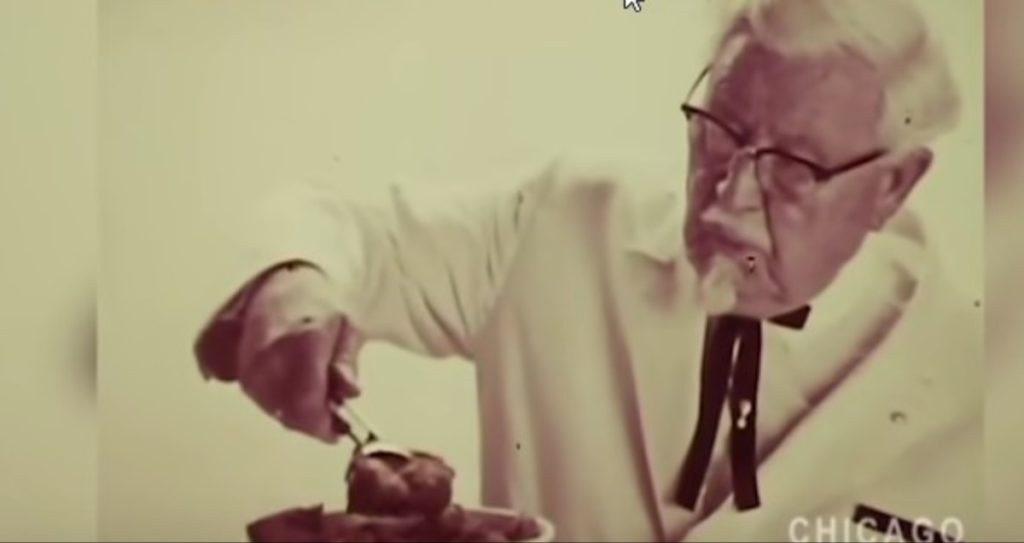The man behind the Kentucky Fried Chicken fast food chain led a truly colorful life, but a recurring meme dating back at least as far as 2016 obscures the facts in favor of presenting a more “inspirational” version.
One version of the purported biography of Harland David Sanders has been shared thousands of times on Facebook since being posted:
At age 5 his father died.
At age 16 he quit school.
At age 17 he had already lost four jobs.
At age 18 he got married.
Between ages 18 and 22, he was a railroad conductor and failed.
He joined the army and washed out there.
He applied for law school, he was rejected.
He became an insurance sales man and failed again.
At age 19 he became a father.
At age 20 his wife left him and took their baby daughter.
He became a cook and dishwasher in a small cafe.
He failed in an attempt to kidnap his own daughter, and eventually he convinced his wife to return home.
At age 65 he retired.
On the 1st day of retirement he received a check from the Government for $105.
He felt that the Government was saying that he couldn’t provide for himself.
He decided to commit suicide, life wasn’t worth living anymore; he had failed so much.
He sat under a tree writing his will, but instead, he wrote what he would have accomplished with his life. He realized there was much more that he hadn’t yet done. There was one thing he could do better than anyone he knew. And that was how to cook.
So he borrowed $87 against his check and bought and fried up some chicken using his recipe, and went door to door to sell them to his neighbors in Kentucky.
Remember, at age 65 he was ready to commit suicide.
But at age 88 Colonel Sanders, founder of Kentucky Fried Chicken (KFC) Empire was a billionaire.
The meme concludes with an attempt at an inspirational quote:
Moral of the story: It’s never too late to start all over. MOST IMPORTANTLY, IT’S ALL ABOUT YOUR ATTITUDE. NEVER GIVE UP NO MATTER HOW HARD IT GETS. You have what it takes to be successful. Go for it and make a difference.
Despite failing to account in any way for structural imbalances across the financial and political spectrums, tech news site The Verge reported in 2016 that this version of Sanders’ story spread through the “muddy internet backwater where only inspirational anecdotes tend to flourish.”
One key falsehood in the “inspirational” biography is stating that Sanders was ready to take his own life when he was 65 years old. In reality, it marked a different turning point: that was the year that the entrepreneur sold his original restaurant in North Corbin, Kentucky and set about traveling around the United States looking for restaurants willing to become Kentucky Fried Chicken franchises — not “door to door” to neighbors. He did not actually sell the company until he was 73 years old, for $2 million.
The portions of the meme claiming that Sanders “failed in an attempt to kidnap his own daughter” and received a “government check” that annoyed him appear to be drawn from a Jehovah’s Witness-related webpage reproducing what it claims is an article published in 1980 by the Los Angeles Times Syndicate, with no other citation. In 2000, the syndicate became part of Tribune Media Services.
A profile of Sanders published by The New Yorker in 1970 also shows that his life was far more colorful and interesting than the supposedly “inspirational” meme:
He stayed in farm work until he was fifteen. Between the ages of fifteen and forty, he worked as a streetcar conductor in New Albany, Indiana; served in the Army, in Cuba; got married and had three children (this marriage ended in divorce thirty-nine years later, in 1947); worked as a fireman for railroads in Alabama, Tennessee, Arkansas, and Virginia; studied law by correspondence and practiced in the justice-of-the-peace courts in Little Rock; sold insurance in Kentucky and Indiana; operated a steamboat ferry between Jeffersonville, Indiana, and Louisville, Kentucky; worked as the secretary of the Columbus, Indiana, Chamber of Commerce; manufactured acetylene lighting systems for farmers, in Columbus; sold tires in Kentucky; and ran service stations in Nicholasville.
“He was not a billionaire, but he lived in comfort for the remainder of his years,” The Verge said of Sanders, who died on December 16, 1980 at the age of 90. It is true, however, that Sanders was commissioned as a Kentucky Colonel — a symbolic honor given within the commonwealth to recognize outstanding public service or achievement — on two occasions, in 1935 and 1950.

